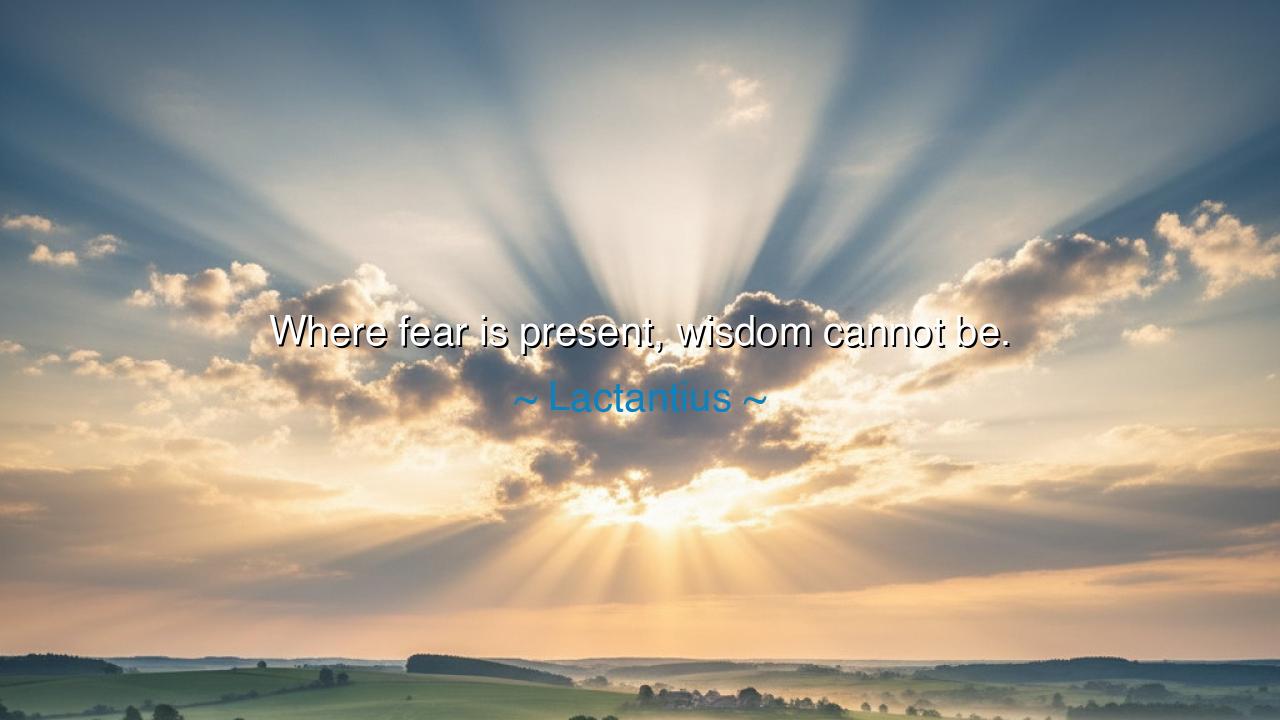
Where fear is present, wisdom cannot be.






Lactantius, the Christian sage of late Rome, proclaims with solemn gravity that where fear is present, wisdom cannot be. In these words he unveils a law of the soul: that terror clouds judgment, and the trembling heart cannot see the path of truth. For wisdom requires clarity, patience, and steadiness, while fear drives men to haste, folly, and ruin. Just as a storm darkens the heavens and hides the stars, so does fear blot out the inner light that guides the mind toward right action.
The ancients knew this truth in their own struggles. King Saul, seized by fear of the Philistines, abandoned the counsel of patience and rushed into sacrifice, earning rebuke and the loss of his kingdom. Fear did not strengthen him; it blinded him to obedience and clouded his wisdom. In contrast, David, though young and unarmed, faced Goliath without fear, and by his courage was able to act with clarity and triumph. Thus Lactantius teaches that fear does not only weaken the body—it corrupts the mind and silences wisdom.
History also bears witness in the fall of mighty empires. When Constantinople trembled under the shadow of the Ottoman cannon, fear gripped its leaders, and in their panic they turned to desperate measures rather than sound strategy. Their hearts quailed, and wisdom fled. Fear hastened the city’s ruin, showing that even the strongest walls cannot stand if the spirit within them is conquered first.
Yet the same history shows the opposite in moments of courage. Consider Winston Churchill, standing before a frightened Britain during the Second World War. While others clamored for surrender, he cast aside fear and spoke with the clarity of defiance: “We shall never surrender.” In his fearlessness, wisdom took root, guiding a nation through its darkest hour. It was not knowledge alone that saved Britain, but the banishment of fear that made wisdom possible.
Let future generations learn: fear is a tyrant that imprisons the mind, while wisdom is a flame that requires calm air to burn bright. He who allows fear to rule cannot hear the voice of truth, but he who casts off fear will find his judgment steady and his path clear. For wisdom dwells only in the heart that is free, and no man trembling in terror can walk in its light.






THNguyen Trung Hieu
This statement makes me reflect on the role of emotions in critical thinking. Is Lactantius suggesting that fear inherently clouds judgment, or that wisdom demands courage and emotional control? I’d like to examine whether fear can coexist with wisdom if properly managed, or if the mere presence of fear always distorts perception. How can individuals train themselves to respond thoughtfully rather than reactively when confronted with fear-inducing situations?
UNUyen Nguyen
Reading this, I wonder if the quote applies to both individual and collective contexts. For example, can societies governed by fear truly act wisely, or does fear lead to reactive and short-sighted policies? I’d like to explore whether education, reflection, or mindfulness practices can help reduce fear’s influence, creating a mindset where wisdom can thrive even in the face of uncertainty or threat.
PMHo Thi Phuong Mai
I’m intrigued by the idea that fear and wisdom are mutually exclusive. Could this mean that personal growth and understanding require confronting fears directly? I’d like to consider practical implications: how does one achieve wisdom in high-stress environments or dangerous circumstances? Does overcoming fear create space for insight, or is it the absence of fear that allows for clear and rational judgment?
PHNhu Yen 6A6 Pham Huynh
This quote makes me wonder about the relationship between fear and decision-making. Does fear truly block wisdom, or can it sometimes serve as a cautionary guide that informs prudent choices? I’d like to explore whether Lactantius views fear as entirely paralyzing, or if he differentiates between irrational fear and healthy caution. How might we cultivate clarity of thought in emotionally charged situations where fear is inevitable?